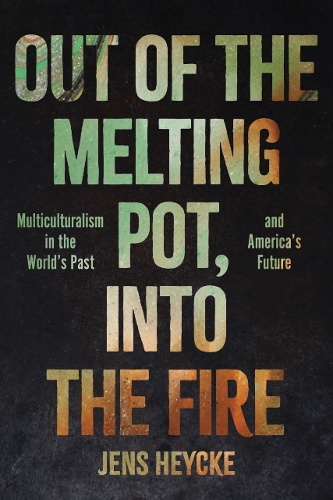
Out of the Melting Pot, into the Fire: Multiculturalism in the World's Past and America's Future
(Hardback)
Publishing Details
Out of the Melting Pot, into the Fire: Multiculturalism in the World's Past and America's Future
By (Author) Jens Kurt Heycke
Encounter Books,USA
Encounter Books,USA
18th July 2023
United States
Classifications
General
Non Fiction
Ethnic groups and multicultural studies
Racism and racial discrimination / Anti-racism
305.8009
Physical Properties
Hardback
272
Width 152mm, Height 228mm, Spine 30mm
Description
The melting pot has been the prevailing ideal for integrating new citizens through most of Americas history, yet contemporary elites often reject it as antiquated and racist. Instead, they advocate multiculturalism, which promotes ethnic boundaries and distinct group identities. Both models have precedents across the centuries, as Jens Heycke demonstrates in a contribution to the debate that incorporates an international, historical perspective.
Heycke surveys multiethnic polities in history, focusing on societies that have shifted between the melting pot and multicultural models. Beginning with ancient Rome, he demonstrates the appeal of a unifying, syncretic identity that diverse individuals can join, regardless of their ethnic or racial origins. He details how early Islam, with its ideal of an inclusiveummah, integrated diverse groups, and even different faiths, into a cohesive and flourishing society. Both civilizations eventually abandoned their integrative ideals in favor of a multicultural paradigm. The consequences of that paradigm shift are instructive for societies that seek to emulate it.
In the modern era, many nations have implemented multicultural policies like group preferences to compensate for past injustices or current disparities. Heycke examines some notable examples: Yugoslavia, Rwanda, and Sri Lanka. These nations were on a rough trajectory toward ethnic tolerance and comity, a trajectory that multicultural policies altered dramatically. They contrast with Botswana, a country that opposes group distinctions so resolutely that it prohibits the collection of racial and ethnic statistics.
Since World War II, ethnic conflicts have killed over ten million people. But the consequences of ethnic division go far beyond that. Heycke analyzes those consequences in an international statistical survey of ethnic fractionalization. This survey, combined with the extensive historical record of multiethnic societies, illustrates the staggering costs of accentuating group differences and the benefits of a unifying identity that transcends those differences.
Reviews
Jens Kurt Heycke provides a much-needed, meticulously researchedand courageousdefense of the melting potfrom classical antiquity to 21st-century America. His data and analyses show how and why the assimilationist modelalone has always unified fractionalized ethnic and racial groups into a coherent national whole.Out of the Melting Pot, Into the Firestands asa dire warningto beleaguered Western democracies that have foolishly rejected the melting pot that has so often proven the pathway to their survival and success.
Victor Davis Hanson, The Hoover Institution, Stanford University, and author ofMexifornia: A State of Becoming
The United States has been, from its colonial beginnings, a multiethnic society. It has had to choose between being a melting pot societyassimilating newcomers and, while appreciatingdifferent heritages, seeking a single national identityand a multicultural society, with separate enclaves and official quotas and preferences for those deemed members of different groups.Americans are not the first nation to face such a choiceand, inOut of the Melting Pot, Into the Fire,Jens Kurt Heycke shows how other societies have faced this choiceand why Americans should embrace the melting pot modelin the future.
Michael Barone, senior political analyst,Washington Examiner, and founding co-author,The Almanac of American Politics
Author Bio
JENS KURT HEYCKE was educated in Economics and Near Eastern Studies at the University of Chicago, the London School of Economics, and Princeton University. He worked as an early employee and executive in several successful technology startups, including one that pioneered the mobile Internet and produced software installed in more than a billion mobile phones. Since retiring from high tech, he has worked as a writer and independent researcher, conducting field research around the world, from Bosnia to Rwanda. He is an internationally competitive masters cyclist, winning a bronze medal at the World Masters Games and top-ten places in other world championship events.
